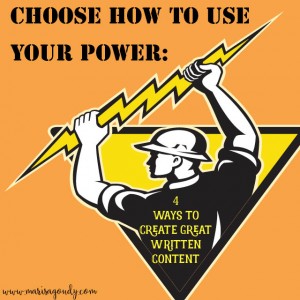
BLOG
Four Common Traits Lethal to Rock Stars and Blog Writers
You know the songs that matter. They have a way of illuminating your past. At the same time, they shed new light on your present and make you look forward to a brighter future. (Articles and blog posts can do this too, of course.)
I’m still unfurling my muscles after a few days stuck in the back of a fully packed minivan. We’ve just completed the summer pilgrimage up to the Canadian Maritimes. Members of my family have been making this trip since my grandparents immigrated to Boston in 1949.
Such trips are a chance to go back in time - even as you’re unmistakably immersed in the present and the future. Countless stories about the people you've loved and lost are told over the noise of the newest generation.
Between the reminiscing, reciting every nursery rhyme I knew to soothe the toddler, and fending off the five year-old’s requests for yet another ice cream cone, there actually were a few quiet moments in the van.
What U2 can teach you about presenting content to people who care
As I watched the Prince Edward Island farmland stretch to ocean, I caught a U2 song I vaguely remembered.
It wasn’t blurred by time - U2 songs from twenty-five years ago are indelibly etched in my mind. This was a new song from that “oops” album that the band pushed at everyone last year.
U2 “gifted” the album to everyone with an iTunes account. Songs of Innocence wasn’t addressed to the faithful fans or even rock music listeners. It was launched at 500 million people, many of whom didn’t know the difference between U2’s lead singer and some guy who used to be married to Cher.
The chosen audience for this music - everyone - simply didn’t care.
Ego, generosity, self-promotion, and fear are a lethal combo - for rock stars and for writers
If U2's “oops” appeared on your radar screen, you likely recall the backlash.
No one even had time to notice whether the music was any good because they were so angry that it appeared unbidden on their iPhones. (And if anyone from Apple dares to take up one more blessed megabyte with content we don’t actually want, there will be rioting. Or snarky tweets. Whichever.)
Shortly after the album’s release, Bono apologized for their tactics and tried to explain why they did it:
A drop of megalomania, a twitch of generosity, a dash of self promotion – and deep fear that these songs that we poured our life into over the last few years mightn’t be heard.
Why should you, a content creator and small business blogger, care about a U2 album that will only endure as a reminder that free music isn’t free if you have to pay the fines of public ridicule?
Like it or not, you likely blog and write online content for the same reasons U2 paired up with Apple. Though each element that Bono describes can be good in itself, when mixed together you find yourself in a fine mess.
- Ego (“megalomania” is a term best reserved for rock stars and CEOs, so let's scale it back): When you write merely to hear your own voice and to rack up shares and likes, you’re going to lose track of your online raison d’etre - the reader.
- Generosity: When you give away all your insights you’ll bankrupt yourself and compromise the quality of what you offer to your paying clients.
- Self-Promotion: You blog in order to build an online platform, but, if you’re writing in order to be seen rather than to deliver value, you’ll end up alienating your audience.
- Fear: Any venture motivated by fear is bound to fail eventually. Blog posts written in the spirit of “if I don’t get something out on time my readership will forget all about me!” will never be as successful as those grounded in wisdom and anchored in trust that your message is worth listening to.
What happens when you write a blog post for just anyone
This particular track I heard? “Song For Someone.” The irony was kinda crushing...
When U2 chose to toss their album on everyone’s digital doorstep like a piece of junk mail, they lost track of the special someones who stuck by them even after a decade (more?) of cringeworthy releases.
In order to make a song connect and endure, it has to be sung to someone who wants to listen.
If you want a piece of writing to connect and endure, it has to be addressed to someone who is receptive to the message.
“Someone” doesn’t care about what you have to say. A carefully considered ideal reader who has the problems that your goods and services aim to solve… she’s the one you need to write for (or sing to!).
Everything you bublish needs to be a song for someone in particular
“Song For Someone” will never be anyone’s “With Or Without You.”
Maybe it’s because the song was tinged with that ego, misdirected generosity, self-promo, and fear. Maybe it’s because the band lost sight of what really mattered in their bid to stay relevant and be as cool as Apple.
Maybe it’s because Bono has been more focused on saving the world than he has on music. There are plenty who say that’s a fine thing. And if his mistake makes you a better blogger, just put on Joshua Tree and get writing!
Want to learn more about how to write for your special someone? Consider joining the Sovereign Writers Circle.
The Agony and the Ecstasy of Following Your Own Advice
 This post is being written from an undisclosed location. There’s no cell service, but there is WiFi, and while I have not completely honored the “no work during this vacation” rule, I have only popped on to social media to do professional stuff, not to post pictures of my girls in paradise.
I’m in my sacred place. When I tuck my girls into bed, in addition to calling in the sweet family ghosts, I bid my own child-self to watch over them.
This post is being written from an undisclosed location. There’s no cell service, but there is WiFi, and while I have not completely honored the “no work during this vacation” rule, I have only popped on to social media to do professional stuff, not to post pictures of my girls in paradise.
I’m in my sacred place. When I tuck my girls into bed, in addition to calling in the sweet family ghosts, I bid my own child-self to watch over them.
Here, my daughters count the same faded roses on the wallpaper of the “middle bedroom.” They creak back and forth in the same backyard swing. They’re told not to pull the bark from the same birches that line the grove beside the house like rows of endless summer sentinels.
My decision to keep the photos in the sanctity of my own smartphone’s memory wasn’t a conscious one.
I may start Instragramming at any moment. But each time I consider it, I think of the two days we spent in the car to get here. Maybe you need to put yourself through that to take part in this sort of beauty.
Or maybe I’ll feel like this kind of perfection shouldn’t be hoarded and I will start to share.
And so, it seems that I am taking my own advice. A couple weeks ago, I asked is that adventure really worth blogging about?
This adventure is worth so much more. The blog can wait. The heron in the marsh, the tea in the pot, the children rooting into the same red earth that’s so much a part of their mama… that needs my attention right now.
A couple of sweet reads on the topic of pausing for what’s most important:
Brenna Layne talks about Recalibrating. Full of perfect lines, this piece is about getting back to the routine, making peace with being away, and wrestling a neglected story back into relationship with a big bear hug.
Stories, like people, get crotchety if they’re ignored.
Autumn is a truthful season, revealing the world in all its messy glory.
And then there’s Suzi Banks Baum on her Laundry Line Divine. In Monday Morning at the Lake she writes of how she took the advice about whether each summer holiday adventure needed to be blogged about. I love the way she danced with the idea, typing lightly in the midst of family in her most beloved place.
Creative practice happens no matter what the sky looks like.
So true, Suzi, but creative practice may need to take on a totally new form that has nothing to do with blogging and entrepreneurial vision when the sky looks like this...
Hold on there, summer friend - is that adventure really worth blogging about?
Sovereign Standard, Issue 24 It's one of those working-vacation weeks. You know the type -- you hope to be at least semi-productive and still have a good time (all the while ensuring that your own deadlines don't kill anyone else's relaxation buzz).
It's one of those working-vacation weeks. You know the type -- you hope to be at least semi-productive and still have a good time (all the while ensuring that your own deadlines don't kill anyone else's relaxation buzz).
I think I'm managing this tightrope act as the girls and I visit the folks back at home on Cape Cod.
Juggling and magic shows, long days at the beach with multiple sunscreen applications, and mom trying to get some client stuff done after everyone is asleep… You know, the usual.
I started to write a post about why the internet is like sharing news with a big, noisy family.
There was an outside possibility that it was going to be the best thing I’d ever written. Honestly though, the Red Sox have a better shot at the pennant than I have at making that post worth more than a “that’s nice” comment as you, dear reader, return to your “if only I wasn’t working right now” daydreams.
But now, I'm typing this at the breakfast table. In case you didn't know - laptops and eggs and that beautiful noisy family on a perfect Cape Cod August morning don't mix.
The few paragraphs I had written about how the digital world is like endless summer have about as much life in them as a deflated beach ball. Because I love you, I am going to spare you all that.
I could slam the laptop shut and climb back into a bed full of sand rather than hit publish (the joys of sharing a sleeping surface with an 18 month old who naps right after the first beach trip of the day).
Instead, I am writing about what’s not really worth saying.
Do not pour another precious hour into a blah, blah, blah blog post that you can’t even be bothered to care about until you pause a moment.
Is it time to step away from the keyboard?
Ask yourself: Is it worth writing anything at all?
The answer is NO if you don’t have a steady commitment to your newsletter and blog reader.
Don’t force yourself to meet some personal, arbitrary writing deadline if you don’t really have anything to say. You run the risk of losing them forever because you couldn’t bring your “A” game.
The answer is YES if you have a palpable enough connection to your readership that they’ll care about your well-deserved vacation or your writer’s block or the distraction that is keeping you from doing the “real” writing.
Just be cautious here - the same “make the reader the hero” rules apply here. Your hard working readers want the best for you, but what’s in it for them as you share your bliss and your struggles?
The ultimate test: do you have a Call to Action?
 In my case, I am writing about not writing because I know that you need some guidance about what not to say as much as you’d like help with deciding what you want to say.
In my case, I am writing about not writing because I know that you need some guidance about what not to say as much as you’d like help with deciding what you want to say.
The clincher question as you decide whether or not to spend another summertime minute on a blog post: do you have a call to action?
A call to action is that thing you ask your reader to do at the end of each post (sign up for the list, listen to this podcast episode, attend my next event, etc.). It’s the raison d’etre for any particular post on your business blog.
When you know what your reader to do, it’s pretty easy to write them in that direction.
If you’re too busy thinking about whether the kids are getting a burn or whether the next drink will have an umbrella in it to think about what your reader should do when they’re done reading, it might be a good idea to skip posting an article this week.
My call to action for you
Trust the present moment. Observe the needs of your business and the tides of your life.
Write when you’re called to.
Step away from the laptop when you can.
Bring your best to your family and your readers and give each group the time they really need.
How to Crack Your Readers Wide Open
Sovereign Standard, Issue 23 Open letters aren’t new.
Open letters aren’t new.
The Bible is full of them. The advent of the printing press gave secular writers the chance to play the “Dear Joe, I’m going to write to you personally in order to tell everyone how much I disagree with you” game.
And, of course the internet has given all of us the power to reach multitudes with one carefully aimed piece of prose.
This week, writer and activist Naomi Wolf published an open letter in Britain’s The Guardian newspaper.
Young women, give up the vocal fry and reclaim your strong female voice had such promise! A famous feminist appearing in a major publication to speak to young women about using their powerful voices? Who cares that I had no idea what “vocal fry” was… I was prepared to read, heed, and share.
It turns out “vocal fry” is a speech pattern adopted by Millennial females. Apparently it’s a Kardashian thing, but since I pride myself on ignoring them completely, I needed to watch the video to figure out what it is.
[embed]https://youtu.be/YEqVgtLQ7qM[/embed]
According to Wolf:
Vocal fry” has joined more traditional young-women voice mannerisms such as run-ons, breathiness and the dreaded question marks in sentences (known by linguists as uptalk) to undermine these women’s authority in newly distinctive ways. Slate notes that older men (ie those in power over young women) find it intensely annoying.
The video is hyper critical. Old guys allegedly hate it. But, to be honest, I’d never even considered creaky voice syndrome before.
Was that because I don’t hang with enough twenty-somethings? Wait, I do! Are my daughters’ babysitters teaching them to croak and I’ve never noticed? Or (worst of all) is it because I do it myself?
Open Letters that Crack Open the Reader's Inner World
 At 11 PM when you’re reading one last article before you brush your teeth (even though you know late night screen time is the #1 sleep killer) the last thing you need to do is start reviewing your own YouTube clips to figure out if your vocal patterns would irritate the majority of the members of the Supreme Court.
At 11 PM when you’re reading one last article before you brush your teeth (even though you know late night screen time is the #1 sleep killer) the last thing you need to do is start reviewing your own YouTube clips to figure out if your vocal patterns would irritate the majority of the members of the Supreme Court.
I considered pulling out the headphones to do just that. But then I found an open response that saved me from all that paranoid analysis.
In An Open Letter To Naomi Wolf: Let Women Speak How They Please Debbie Cameron offers:
What’s really destructive and undermining to women is not their way of speaking but the constant criticism to which their speech is subjected. Telling women their speech habits are bad and wrong is not going to make them more confident speakers: it’s more likely to reduce them to silence. Continually repeating that women’s speech lacks authority just gives people yet another reason to dismiss whatever they say as unworthy of serious attention.
Debbie Cameron, we just met, but I’m sort of in love with you (and I say that without an upspeak question mark that would in any way limit my authority because I am so damn sure about how awesome you are).
I'll be listening for vocal fry in myself and others, but you stopped me from obsessing about it before I even had a chance to start. I've got video production plans in the works so it means the world to me!
What does this have to do with why your writing matters?
Whether or not you’re particularly concerned with your own speech patterns or those of the rising generations (though I hope you are since these women are or will be your clients and customers!), there’s one thing to take away from all this:
These open letters were powerful enough to push my bedtime back by an hour as I reconsidered something as fundamental as what happens when I open my mouth.
You have this power too.
Essentially every blog post you write is an “open letter” to your ideal client - and it could change everything.
Demian Farnworth has a great podcast episode about how effective it is to address every blog post to one person and start with "You've been on my mind lately." (Of course you won’t publish those words, but that’s what’s in your head as you write.) That approach instantly prepares you to write about what really matters to the audience members who matter the most to you.
Write about something that speaks directly to the concerns and, yes, insecurities of your ideal client and you’ll open up doors to their inner world. The question is - what solutions will you offer once you’re inside their inner sanctum?
The Sovereign Standard is a weekly newsletter that invites you to explore writing, entrepreneurship, and everyday creative magic from a fresh angle. Subscribe today!
Choose How to Use Your Power: 4 Ways to Create Great Written Content
Sovereign Standard, Issue 22 We live in an abundant universe and we are the ultimate authors of our lives.
We live in an abundant universe and we are the ultimate authors of our lives.
That’s all fine and good, but you only have so much time to write your business’s stories and get that blogging done.
How are you going to use your power?
“Write this week’s post” or “update the website copy” are on your to do list. You've decided to apply your power to crafting your ideas into words and sharing them with people who want lives that are more beautiful, bearable, or bold. Yay!
 And you intend to take the ideas from draft to final copy all by yourself because you love to write, you’re on a budget, or because you fear you’d sacrifice authenticity if you outsourced it… but is that the right choice? Is that how you really want to use your power?
And you intend to take the ideas from draft to final copy all by yourself because you love to write, you’re on a budget, or because you fear you’d sacrifice authenticity if you outsourced it… but is that the right choice? Is that how you really want to use your power?
As I write this, my five year old is trying to make the Eiffel Tower out of mostly dried up Play-Doh. I am only 95% sure that the markers my toddler is using to draw all over her t-shirt are washable.
My maternal powers are diluted and I'm sure every paragraph I write is riddled with typos.
But I am making it work. I choose to see myself as powerful - at least according to Michele Woodward’s definition.
“Power is the ability to get stuff done.”
This definition was a common refrain in a recent How She Really Does It podcast in which Michele and Koren Motekaitis put a positive spin on power. Yes, we all have the capacity to build and store power, but how are we going to use power in helpful, efficient ways?
Choose How to Use Your Power: 4 Different Ways Create Great Written Content
You’re on board with content marketing. You’ve been storing up stories and ideas for ages. Your website looks great and is waiting for the right copy and a consistent blog.
It’s time to channel your power and get this writing stuff done. How do you make that happen?
The answer isn’t necessarily simply “go write.”
1) Give it up: Outsource your content writing completely
You can fully empower a ghostwriter to do it all from topic research to writing to image selection to posting the piece.
When this works best: There are lots of news and information sources related to your field that a trusted writer can review and translate for your audience based on your company story. Early in my writing career I combed the medical research and did this sort of blogging for a nutritional supplement company.
When this doesn’t serve you: If you have a personal brand, it’s reliant on your voice and your stories. This hands-off approach doesn’t generally serve coaches, healers, or those who sell information and wisdom that stems from personal experience.
2) Team up: Partner with a writer
Develop a relationship with a writer who becomes part of your team. She’ll get to know you, your brand, and your vision and ask questions from an outside perspective that will help expand your vision of what you’ll have to offer. You’re part of the brainstorming process but she takes care of organizing all the ideas and making the words sing.
When this works best: You have a ton of big ideas and general concepts you want to share. Your business is strong enough that you can afford to invest in this process – good writers will require a lot of time and attention at the beginning as they endeavor to really understand you, your voice, and your brand.
When this doesn’t serve you: Even though you are very involved in the process and will be the instigator of every piece of writing, you’re a step removed from the process. Since you’ve both agreed that the writer would publish under your name and you paid for the service, the intellectual property is yours and the product is 100% yours. But, if you have a writer’s soul you may not feel that this option suits your needs.
3) Tune up: Hire a Writing Coach
When you work with a writing coach, it's your writing - only better. A writing coach will help you meet your editorial goals now and build skills that will take you far into the future. Plus, you'll have the insights that only a "second pair of eyes" can really offer. This makes you a better writer and it also helps you dig deeper into your own stories and wisdom.
When this works best: Writing doesn’t come all that easily to you, but you want to get better at it. Or maybe it's easy for you to fill "ideas" notebooks but you never make the time to turn that material into polished posts. You also worry that your writing style doesn’t lend itself to the needs of the skimming internet audience. No matter what, the stress over making it perfect kills the joy you find in the process.
Learn more about the writing coaching relationship.
When this doesn’t serve you: Your business is at a stage where you’re more focused on scaling your business and landing speaking gigs. You don’t harbor any dreams of being a writer and would be better served partnering with a writer who can translate your ideas into prose.
4) Train up: For the bootstrapper who has time to teach herself the craft
Writing is a skill. The more you practice, the better you’ll get at it. There are loads of resources out there from Copyblogger’s free library and paid training programs to big old books on the subject like the Copywriter’s Handbook by Robert W. Bly. I refer to both when I’ve written myself into a corner, I need inspiration, or I need help remembering that writing for the internet is more about selling than writing much of the time.
When this works best: You have more time than money to invest in sharpening your writing skills. You likely trust your writing skills enough and enjoy writing enough that you can follow a set of tips to tune your craft.
When this doesn’t serve you: Writing scares you and depletes you and you’re intimidated rather than energized by the DIY approach. You understand that consulting with an expert who is focused on your individuals needs and challenges will help you build your business and your writing skills faster and more efficiently.
How will you use your superpowers to get more of the vital work done?
I’ve been “the writer” in all these situations. Because every entrepreneur, creative, and healing professional has her own needs and superpowers, each writing approach is valid.
At this stage in my career, I see my clients experience the most personal growth and satisfaction when they go the writing coaching route. In addition to producing great content today, they’re preparing themselves to handle a marketing scene that will always demand good writing. And when it’s time to write that book? They’re ready.
How can I help you amplify your superpowers? Check out the services page.




